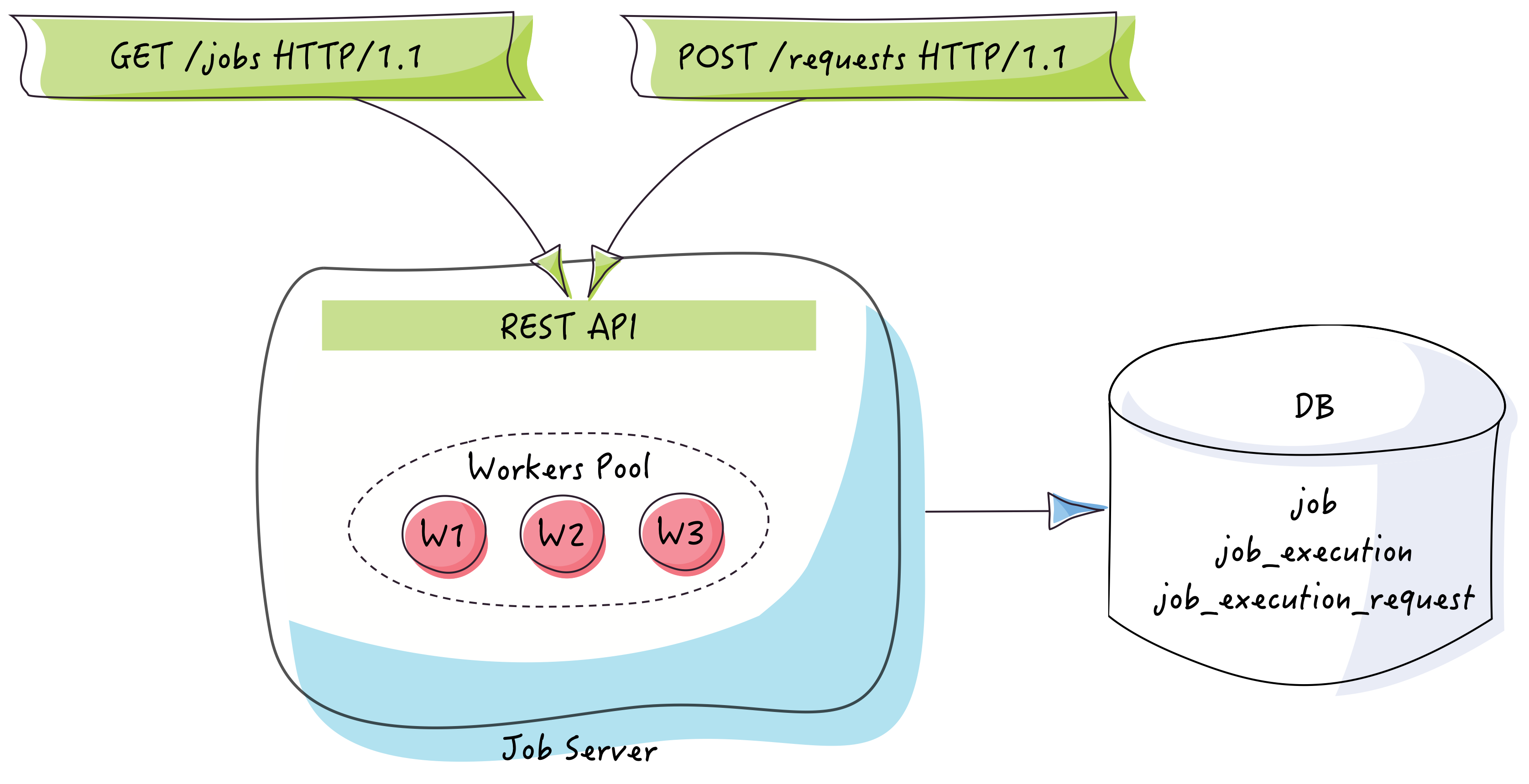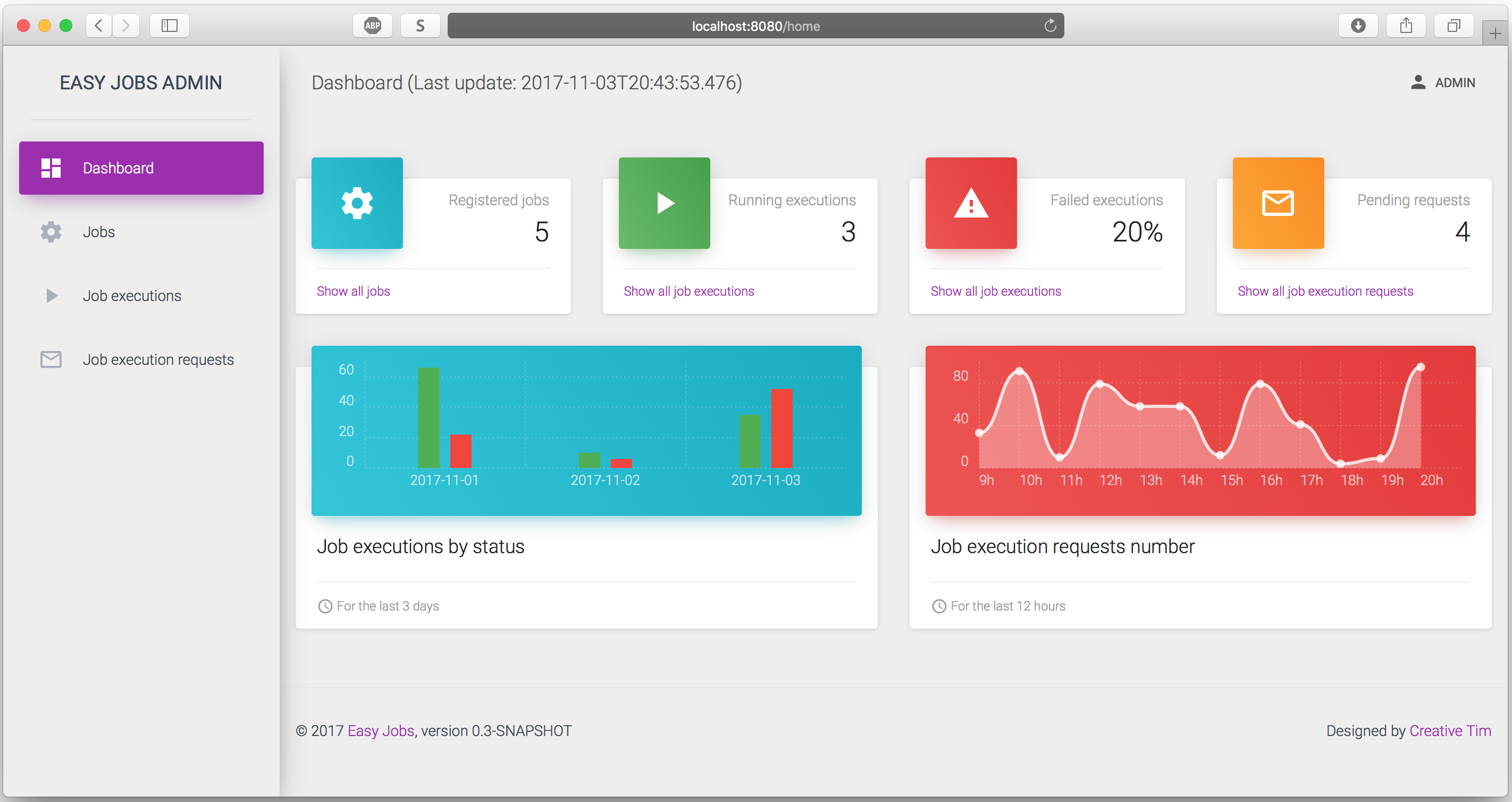The simple, stupid job server for Java™
- 24/07/2018: Version 0.4 is out to fix a small issue with the startup of the admin UI.
- 05/11/2017: Version 0.3 is out with a new administration web interface. See all changes in details here.
- 29/06/2017: Version 0.2 is released with some bug fixes and few enhancements. See all changes in details here.
- 22/06/2017: Version 0.1 is out! See what this first version brings to the table here.
Easy Jobs is a simple job server for Java. It allows you to define jobs and request their executions through a RESTful API.
Easy Jobs stores meta-data of jobs in a relational database. Three tables are used: job, job_execution and job_execution_request.
The job server polls the job_execution_request table regularly looking for pending job execution requests.
When a job execution request comes in, the job server creates a job instance of the requested job and executes it:
The job server uses a pool of worker threads to execute jobs. Job execution requests are submitted through a RESTful API. For more details about these design choices, please refer to the technical notes.
Download the latest release and unzip it. You should get a directory with the following content:
$>cd easy-jobs-dist-0.4
$>tree -d
├── conf
├── drivers
│ ├── h2
│ └── mysql
├── jobs
└── lib
├── admin
└── serverRun the job server with the following command:
java -cp "drivers/h2/*:lib/server/*" \
-Deasy.jobs.database.config.file=$(pwd)/conf/database.properties \
-Deasy.jobs.database.config.init=true \
-Deasy.jobs.server.config.jobs.directory=$(pwd)/jobs \
-Deasy.jobs.server.config.jobs.descriptor=$(pwd)/conf/jobs.yml \
org.jeasy.jobs.server.JobServer
If you are on windows, use the following command:
java -cp "drivers/h2/*;lib/server/*" ^
-Deasy.jobs.database.config.file=%cd%\conf\database.properties ^
-Deasy.jobs.database.config.init=true ^
-Deasy.jobs.server.config.jobs.directory=%cd%\jobs ^
-Deasy.jobs.server.config.jobs.descriptor=%cd%\conf\jobs.yml ^
org.jeasy.jobs.server.JobServer
That's it! The job server should be up and running waiting for you to submit job execution requests. To submit a job execution request, you can use either the REST API or the Admin Web Interface.
By default, the job server will be started on localhost:8080. You can change the port as well as other parameter as described in the wiki.
In the previous command, we used H2 database which is fine for testing but not recommended for production. You can use another supported database if you want.
The distribution comes with a sample job called HelloWorldJob located in the jobs directory. Here is its source code:
public class HelloWorldJob {
private String name;
public void doWork() {
System.out.println("Hello " + name);
}
// getter and setter for name
}Jobs in Easy Jobs are regular Java classes. There is no annotation to add, no interface to implement or class to extend. Your jobs are simple POJOs. Easy Jobs is not intrusive! But you have to tell it where to find your job using a job descriptor:
---
id: 1
name: hello world job
class: HelloWorldJob
method: doWorkThis job descriptor jobs.yml can be found in conf directory. It gives Easy Jobs all required information to identify your job and execute it when requested.
Let's first check if the HelloWorldJob is registered:
$>curl localhost:8080/jobs
[
{
"id": 1,
"name": "Hello World Job",
"description" : "description: A job that says 'hello' to the given name"
}
]The job server has successfully loaded the job. Now, we can submit a job execution request:
$>curl \
--request POST \
--header "Content-Type: application/json" \
--data '{"jobId":"1", "name":"world"}' \
localhost:8080/requestsThe job server will pick up this request in the next polling run, create a job instance of the HelloWorldJob and execute it with parameter name=world.
Let's check job executions on the /executions endpoint:
$>curl localhost:8080/executions
[
{
"id": 1,
"requestId": 1,
"jobExecutionStatus": "FINISHED",
"jobExitStatus": "SUCCEEDED",
"startDate": [
2017, 6, 23, 9, 25, 13, 939000000
],
"endDate": [
2017, 6, 23, 9, 25, 13, 959000000
]
}
]Great! the job has been executed and finished successfully. You should have seen this in the server's log:
INFO: Received a new job execution request for job 1 with parameters {jobId=1, name=world}
INFO: Found 1 pending job execution request(s)
INFO: Creating a new job for request n° 1 with parameters [{"jobId":"1", "name":"world"}]
INFO: Submitted a new job for request n° 1
INFO: Processing job execution request with id 1
Hello world
INFO: Successfully processed job execution request with id 1
That's all! You can find more details on how to configure the server in the wiki.
You can also download a pre-configured insomnia or postman workspace with all endpoints to help you play around with Easy Jobs server through its REST API.
Easy Jobs comes with an administration web interface:
This interface gives you some insights on a running job server and allows you to submit job execution requests. To run the application, use the following command:
java -cp "drivers/h2/*:lib/admin/*" \
-Deasy.jobs.database.config.file=$(pwd)/conf/database.properties \
-Dserver.port=9000 \
org.jeasy.jobs.admin.Application
On windows, you can use the following command:
java -cp "drivers/h2/*;lib/admin/*" ^
-Deasy.jobs.database.config.file=%cd%\conf\database.properties ^
-Dserver.port=9000 ^
org.jeasy.jobs.admin.Application
For demonstration purpose, you can login to the application using admin/admin credentials.
Make sure the server and the admin interface are running on different ports. In this example, the server is running on port 8080 (by default) and the admin interface on port 9000.
You are welcome to contribute to the project with pull requests on GitHub.
If you find a bug or want to request a feature, please use the issue tracker.
Thank you for your contributions!
Easy Jobs is released under the terms of the MIT license:
The MIT License (MIT)
Copyright (c) 2020 Mahmoud Ben Hassine (mahmoud.benhassine@icloud.com)
Permission is hereby granted, free of charge, to any person obtaining a copy
of this software and associated documentation files (the "Software"), to deal
in the Software without restriction, including without limitation the rights
to use, copy, modify, merge, publish, distribute, sublicense, and/or sell
copies of the Software, and to permit persons to whom the Software is
furnished to do so, subject to the following conditions:
The above copyright notice and this permission notice shall be included in
all copies or substantial portions of the Software.
THE SOFTWARE IS PROVIDED "AS IS", WITHOUT WARRANTY OF ANY KIND, EXPRESS OR
IMPLIED, INCLUDING BUT NOT LIMITED TO THE WARRANTIES OF MERCHANTABILITY,
FITNESS FOR A PARTICULAR PURPOSE AND NONINFRINGEMENT. IN NO EVENT SHALL THE
AUTHORS OR COPYRIGHT HOLDERS BE LIABLE FOR ANY CLAIM, DAMAGES OR OTHER
LIABILITY, WHETHER IN AN ACTION OF CONTRACT, TORT OR OTHERWISE, ARISING FROM,
OUT OF OR IN CONNECTION WITH THE SOFTWARE OR THE USE OR OTHER DEALINGS IN
THE SOFTWARE.





